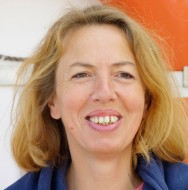Prof. Joanna J. Waniek is a professor for bio-physical interactions in marine ecosystems at the University of Rostock and at the Institute for Baltic Sea Research in Warnemünde (IOW), Germany where she leads her own working group. She is a sea going scientist, with 25 years of work experience. Since 2013 she is the equal opportunity officer at the IOW and member of the internal equal rights committee.

Prof. Joanna J. Waniek
What are the main things you enjoy about being a marine scientist?
Definitely going to sea, being at the ocean no matter how bad the weather is and to see an idea growing from a short note on a sheet of paper to a funded project and being finally published with great results in a good journal.
Did you have any role models that led you to this career? How did they influence you?
Not in the classical sense, related to marine science directly; but I have been encouraged from my childhood on to get involved with natural sciences by my parents. And, my mom started to study medicine when I started school, so I had great time and was having my idol sitting on the same desk like me on daily basis. It was great! Later on, I was fortunate to meet people, who encouraged me to pursue the scientific career and were supporting me in different ways along the path. One of them is the head of the department I work like now, he supports my science and also the equal opportunity work I’m doing right now.
What are your main professional achievements? Any/what obstacles?
Surely obtaining the Professor title, for the academic part of the job, and being nominated/selected by Deutsche Forschungsgemeinschaft (DFG) to join the Academia Net. But actually even more to be internationally recognized for my research on fronts and particle dynamics.
The main obstacle is that I need to spend growing part of my time with administration and the part for science/research is continuously declining.
Have you ever had any difficulties in your career due to your gender? If yes, how did you handle them?
No, not that I’m aware of.
How can we overcome the issues driving women out of careers in marine science and technology?
By addressing their needs on individual basis, giving support before/during/and just after carrier breaks, and definitely we need to work more against stereotypes and our prejudice. We should encourage our male partners to swap the roles as often as possible, and we should raise our male children differently e.g. aware of the gender problem.
What actions are foreseen to reduce gender inequalities in your institution?
Back to research program, allowing young people (especially female BSc/MSc, PhD and Postdocs) with carrier breaks due to family reasons to finish the thesis or publication and/or prepare a proposal for a funding agency. They get financial support for different periods of time; the money comes from the institute budget.
We also organize an annual week of training sessions for the young researches at our institute covering aspects related to research in marine science including writing application, job interview training but also paper and proposal writing.
What is the most effective way for you to maintain balance of your professional and personal life?
My partner is my anchor outside the academia, despite the fact he is working in similar field. We are always making our decisions together for the private life and for the jobs, by taking time for discussing all aspects and clarifying thoughts, fears etc. By doing so we clearly share also the consequences, and avoid this way blaming each other if something does not work. We have also a set of rules we follow to make sure there is space for both of us and our families e.g. weekends free of work at least twice in the month; evenings from 10 pm no more work, but time for us etc.
Sharing responsibilities, decisions and clarifying expectations makes it easier to deal with the job in which both of us are every year frequently away from home for several weeks, often on two different ships and/or cruises at the same time.
What advice would you give any women considering science as a career path?
Make your wishes/aims clear for yourself and stick into it. Be selfish to a certain extend and do not hesitate to get help/advise if needed. Ask people you trust for help and do not forget to campaign for yourself.